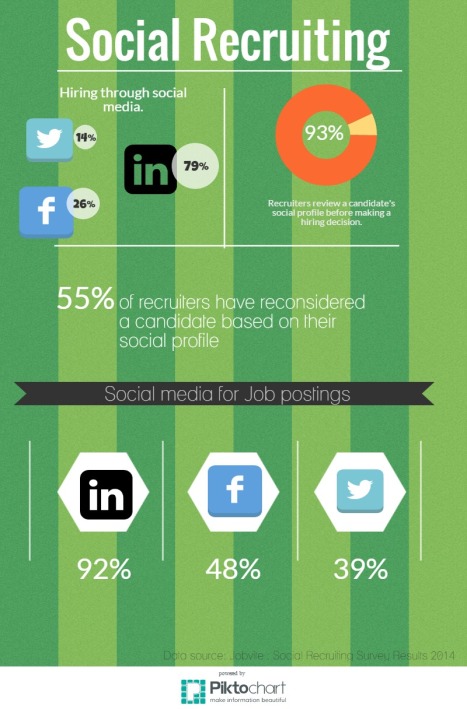Topic 3: May the tweets be ever in your favour.
Thought the job market was tough in 2014? In 2015 69% of recruiters expect job competition to increase. With the competition increasing, there is no time like the present to focus on creating a professional online profile. Recruiters are now looking further than your CV to identify talented candidates. A 2014 Jobvite survey indicates that 73% of employers plan to increase investment in social networking recruitment.
How do you create an online profile that benefits your future employment? The most popular first step is to develop a LinkedIn profile, with 347 million members in over 200 countries it’s a great starting point (LinkedIn, 2014). However, it’s not the only online program and an effective profile should make use of multiple platforms- Facebook and Twitter also play a major role in recruitment. However, these social media sites are now being used to screen applicants, so it’s important to have control of your social networking profiles. David Timis has a great video which shows you how to establish your online profile, and how to use the important networking tools available on LinkedIn.
You need to use the web to create a brand that makes you stand out. Blogging is a great way to do this and shows, in a professional context, what is important to you. Blogging gives you the ability to demonstrate passion, dedication, motivation as well as creativity (The Employable, 2014). A Google or About.Me profile with links to all your online platforms, allows individuals to connect to you efficiently. Maintenance is key, if you have a common name or find that your visibility on Google is poor, the ‘Vizability’ site could help. It’s important to be active on sites such as Google+ and LinkedIn, as they rank highly on Google searches (Snowden, 2011). The video below provides a great summary of online presences and highlights the importance of constantly changing and adapting your profiles.
Nonetheless, it’s important to be authentic, consistent and effective when creating your profiles. You need to create a profile that directs people to content you want them to see, ideally content which is a true reflection of you and your achievements (Chamorro-Premuzic, 2013). Remember that a bad profile can harm your job prospects or even cause you to lose your current job, as these employees learnt.
Remember, when choosing platforms to develop your professional profile, always consider the sector you’re applying to, for example the fashion and photography industries use Pinterest and Instagram as platforms to display their skills (Donnelly, 2014).
Chamorro-Premuzic, T. (2013) The Future of You, Harvard Business Review Blog. Accessed: 05/03/2015
Donnelly, D. (2014) Building your professional online profile, Inspiring Interns Blog. Accessed: 06/03/2015
Eaton, K (2009) If you’re applying for a job, censor your Facebook page, Fast Company. Accessed: 05/03/2015
Jobvite (2014) Social Recruiting Survey.
LinkedIn (2014) About LinkedIn. Accessed: 06/03/2015
Snowden, G. (2011) The Rules of Social Recruiting, The Guardian Online. Accessed: 06/03/2015
The Employable (2014) How blogging can help you get a job. Accessed: 05/03/2015


